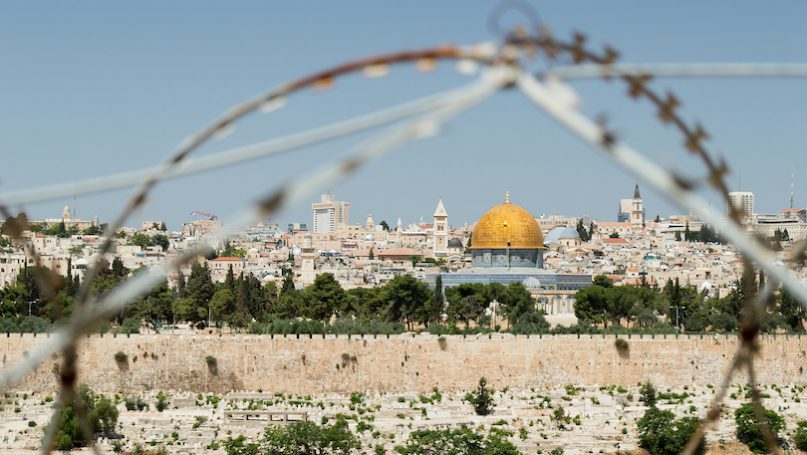
After the decision by the International Criminal Court (ICC) to open an investigation on alleged war crimes committed in Gaza during Operation Protective Edge by Israel Defense Forces (IDF), the IDF’s Chief of Staff, Aviv Kochavi, condemned the ICC’s announcement arguing that the Court is unfamiliar with terrorist tactics. In fact, this is only the last example of a series of practices conducted by the United Nations and global civil society organizations that undermine Israeli security.
Global forums, such as the United Nations, became the stage where non-governmental organisations give a stamp of legitimacy to their attempts of imposing certain narratives. This phenomenon, defined as cognitive warfare, started after the Oslo Accords. Stemming from an internal political debate over the future of Judea, Samaria and Gaza, the Palestinians presented Israel’s presence in these territories as the central cause of the conflict. This narrative became popular in the region and worldwide giving the Palestinians the advantage of presenting themselves as victims and giving the impression that the resolution of the conflict depends on Israeli good will.
In recent years, criticism of civil society players has focused on Israel’s settlement policy in the West Bank and on Gaza’s poor humanitarian situation. The United Nations institutional validation of anti-Israel campaigns and propaganda encourage people to relocate authority and credibility on non-governmental organisations, hence, leaving Israel vulnerable in front of international public opinion.
International civil society’s tactics entail significant implications in terms of national security and must be understood as a non-military threat. In fact, the cognitive campaign, which focuses on people’s cognition of the conflict, is one of the “soft” elements included in military strategy, along with confidence in commanders, fighting spirit, and morale of the fighters. The cognitive sphere is particularly relevant for Israel because of the asymmetrical nature of the conflicts it is involved in. Both in the fights with Hamas and Hezbollah, Israel confronts hybrid terrorist organisations that, de-facto, control their respective territories, but that are not officially recognized as institutional entities.
First of all, Israel is compelled to abide by international moral, humanitarian, and legal standards, on the other hand, its enemies, as terrorist organisations, do not operate under the same principles. They launch indiscriminate attacks through rockets directed at Israeli civilians, while often hiding in civilian facilities and making use of human shields in violation of international norms.
Secondly, in virtue of being a nation-state, Israel is judged in the international arena by entities that ignore the enemy’s tactics and frequent violation of international law. The recent ICC’s initiative is the case. In fact, the Court, opening an investigation on hundreds of Israelis, not only ignores the tactics of Hamas, but also disregard Israel’s justice system and leaves unaddressed the daily human rights violations perpetrated by Hamas and labelled by the terrorist group as “legitimate resistance”. This is clearly translated into limiting Israeli military leeway on the field in order to prevent image-related damages.
Lastly, the cognitive campaign impacts not only the international perception of the conflict, but also the domestic and the adversary cognition of the forces. On the home front, the Israeli public could challenge the ‘justness’ of the cause. On the other side, there is a growing anti-Israel narrative based on the dichotomy of oppressor and victim which, then, becomes popular at the international level.
Challenging Israel’s moral conduct means limiting its military margin in responding and operating against its rivals because of the need of international legitimacy. In other words, Israel is constrained to redesign its military capability in order to maintain international favour. In recent years, several initiatives have been taken in order to reformulate and update Israel’s national security, with the most recent version, “The IDF Strategy”, recognizing “soft” warfare (information, cognitive, and media) as a complementary component of military maneuvering and one of the most pressing issues. Along with the necessity to comply with international law, additional steps were taken. Raising awareness among commanders of how their actions may appear and exploited in the media; making the IDF Spokesperson’s Unit work 24 hours a day with a specific room charged with responding to media information as fast as possible and in different languages; attaching journalists to forces and training combat soldiers as documenters, and creating an available and reliable database and information center.
United Nations’ partiality impacts both the credibility of the organisation and the political, military and humanitarian condition of Israel jeopardizing the human rights’ protection. By giving a stage and legitimizing anti-Israel campaigns, the UN and its network of international civil society organisations contributes to isolating Israel on the international stage and fails to consider the threat exerted by terrorist actors and the related security risks for Israeli citizens. Hence, the State of Israel is compelled to redesign its national security strategy according to image-related considerations. On the other hand, terrorist groups such as Hamas and Hezbollah which cling to the “resistance” narrative, are cognitively advantaged and continue to conduct their deadly activities unpunished.
In order to improve Israel’s national security, the international humanitarian community should, firstly, recognize the well-established narrative against Israel and, secondly, update judicial mechanisms to address asymmetrical conflicts and hybrid terrorist organizations. From its side, Israel, in addition to a pragmatic military approach, should rehabilitate its image by shaping a new narrative through its latest political alliances in the region.
Further Reading on E-International Relations
- State Social Media and National Security Strategy: Israel’s Operation Protective Edge
- The Gaza Crisis: Restrictions and Challenges to the Humanitarian Space in Gaza
- Opinion – Confronting Israel’s Annexation Plans: From Fear to Hope
- Seeing Through the Fog of Justice in Israel and Palestine
- Opinion – Israel-Palestine Policy Under Biden
- Opinion – Discriminatory Ice Cream?